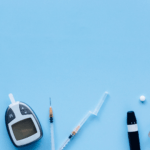There aren’t too many topics that really get me riled up anymore. I’m too old and too busy to care about debating the merits of stem cell research, the legalization of marijuana, or Proposition 8. Sure, I have strong opinions on all of these topics and more, but they are just that – opinions. Furthermore, there are enough other people out there, some reasonable, most irrational, already fighting those fights. So what does get me riled up? Every time I hear someone “assert” that saturated fat and dietary cholesterol lead to heart disease I have to bite my tongue. Why do I bite my tongue?
As Frederic Bastiat once said,
“We must admit that our opponents in this argument have a marked advantage over us. They need only a few words to set forth a half-truth; whereas, in order to show that it is a half-truth, we have to resort to long and arid dissertations.”
This is, unfortunately, quite true. When I’m at a dinner party and someone starts lecturing the table about the perils of saturated fat (or red meat, or eggs, or fill-in-the-blank), I’m at the point – after years of being kicked under the table by my wife – of just asking the “authority” at the table one question: Why do you believe this is true?
I figure, put the burden of proof on them, right? This week, and I apologize for how long overdue this post is, I’m going to get into the details of how this country (and many others who followed our lead) came to believe one of the most pervasive myths in the entire field of nutrition.
To write it all out would require a tome. In fact, such a tome already exists. It’s called Good Calories, Bad Calories. But for most people, especially the “authorities” who already “know” the answer, it’s a complex and lengthy book. Furthermore, it’s not exactly something you can just whip out at a dinner party.
I recently gave a talk at the UCSD medical school. I was asked to give a talk about “ethics.” While I have no professional training as an ethicist, I still think I have a good idea about what is and is not ethical. As I’ve learned more and more about this topic, it appears to me that the state of our current nutritional environment, with food policies based on just about everything but rigorous, experimental science, couldn’t make much ethical sense. I’m pretty sure if Plato, Aristotle, and Nietzsche were still around they’d be disgusted with how we got here. So, I was happy to take this opportunity to speak with a group of thought leaders on this important topic.
I gave a more recent (circa 2015) talk on the subject which captures both the video and and my slides, which I’ll share below. It’s about an hour long. But as Bastiat essentially said, if you want to overturn half-truths, you can’t do it with bumper stickers. Hopefully you’ll find this talk informative and useful for your dinner party discussions.
The link to this video can also be found here, for those reading this post on email or those wishing to view it in a larger format.
Photo by Irina Blok on Unsplash






Here’s something for you to ponder… at 27 years old, weighed (if I remember correctly) about 200 pounds, at 6’2″. I could run a mile in less than 6 minutes. Could run TEN miles in (roughly) an hour… ate well (at least I thought I was). Ate proteins (chicken, fish) took supplements (protein, amino acids, efa’s), some vegetables. Yet, I had a heart attack. My cardiologist said, “we did a blood test. your good cholesterol (hdl) was a little low, but not enough for it to be a concern. your BAD cholesterol (ldl) was WAY too low.” that’s ALL I had received for information as to why. of course, he asked all the standard questions, “do you do…” drugs, drink, smoke, marijuana (which i thought fell into the category of drugs), cocaine… all answered with a resounding “no, I don’t.”
Impossible to know without real data.
Maybe somebody in the future may read this since so many years have passed. My guess is Lipoprotein (a). Primarily genetic, not affected by exercise and there may be a small reduction with diets that raise LDL-C. In short, wait for treatments currently in clinical trials (ASOs, siRNA).
Hi Peter,
I’ve been reading your site for a few weeks now and thought I’d post after getting my most recent lab numbers back. I’ve been doing LCHF for about 3 months now and feeling great otherwise. As expected, my LDL (calculated) went up a bit and triglycerides (245 to 114) plummeted. However, my HDL actually went down (from 45 to 33). It was a bit disappointing to see the drop in HDL.
I have lost quite a bit of weight (of which I’m sure some is lean muscle). I’m interested in knowing if this initial drop in HDL is normal?
Thanks.
No, quite atypical, actually. Definitely worth re-checking in time.
Can you think of any reason this would happen? Too much protein? Not enough fat? I’ll admit my exercise level is far from optimal, but I don’t think that would have an effect on HDL levels. I’ve been scouring the internet, but I can’t find anyone that sees a drop in HDL after starting LCHF.
I am a Type 2 diabetic and currently taking Metformin (2000mg/day). Don’t know if that would make a difference. I do supplement with fish oil (750 DHA 1250 EPA) and various other supplements. I’m just at a loss here. Any thoughts would be greatly appreciated.
Thanks.
Doctor Attia, hope I’m not of topic, but I was wondering if you were familure with the book “Grain Brain” written by David Perlmutter. He seems to agree with many of you thoughts on cholesterol as well as some of the other topics on your site. He also seems to go a little further than reducing carbs and suggests a gluten free diet. If you are familure with his work, what are your thoughts. thanks
Dennis
I generally think his work is sounds.
Funny I came upon this after reading about the myths and such. I don’t understand why our government is continuing on these rampages without educating themselves. OK I was also confused, trans fats? They are taking them out of foods, what would this mean for us? I eat my butter on my white bread, with my eggs, my milk and my home grown bacon. Not sure if it’s good or bad but at this point who the hell knows. Trying to follow trends turns your brain into scrambled eggs. So screw it, they act like they are trying to make us healthier instead they are causing us to give up…
I just wanted to say thanks for all of the great information. I have been engrossed by your webpage for 3 days now whenever I have a free moment. Gotta love technology these days that allow us to fill our brains with knowledge at any moments notice. Anyhow I read about a lot of this type of information a few years ago by a gentleman named Lyle Mcdonald. He has a page https://www.bodyrecomposition.com/ that shares a lot of the same feelings as you do. The first time I read his blogs, It was hard to believe what I was reading. Now having read your Blogs I have a lot of faith in what I have been reading.
I am just now getting back into shape after a few years of being out of construction. You have helped me tremendously with deciding on diet plans for this year. I had almost forgotten about the fat is not bad and the carbs are the enemy. I have always believed somehow that sugar is one of the worst drugs in the world that many americans are simply addicted to. Thank you again for all of the GREAT information you provide! I wish more people could and would read these pages.
From the “Saturated Fats Q&A” on the American Heart Association, I see this: “Eating foods that contain saturated fats raises the level of cholesterol in your blood. High levels of blood cholesterol increase your risk of heart disease and stroke. Be aware, too, that many foods high in saturated fats are also high in cholesterol – which raises your blood cholesterol even higher.” That’s on the AHA website. Today. Right now! I just stumbled upon it. I’ve read some of your pages on cholesterol, Dr. Attia, and I’m interested to hear where your commentary might begin with regard to this content from the AHA.
You should watch the video embedded in this blog post.
Hello Dr Attia,
I am 64 year old female diabetic for 20 years, overweight, with controled A1 but by taking lots of insulin and metformin. Also on BP meds and stantins. I started hflc about 10 days ago cutting out sugar AND wheat and also stopped taking statins and triglyceride lowering drugs and BP meds. I reduced the insulin to only long acting stuff mostly, and much less of the quick acting insulin. I check my blood many times during the day, 3 times minimum sometimes more. I was able to reduce the very low readings and found NO readings higher than 200 blood glucose. I check often because I have not had insurance until recently and was my way of self regulating.
I then had blood tests done because it is the time of year to see my doctor. I get a frantic call from them asking me if I was still taking my drugs because my triglycerides were so high. Well no. I have been enjoying bacon and cream for the last 2 weeks and results are CHOLESTEROL 115 – 200 mg/dL 423 TRIGLYCERIDE 10 – 149 mg/dL 1596. I have always had high triglycerides and never could find answers for this until I read your information. Also, my GRF is 63 up from 50. (BTW why were they not super concerned when it was 50 ???? 18 months ago – my new doctor wants me to get kidney counciling and heart counciling).
So, I believe in your theories – have had an education bar none in the working of insulin resistance and cholesterol from your work. I will have to face these doctors soon and have to try and get them to work with me. Can you tell me how long it will take, or give me an idea, for my triglycerides to go down while continuing on hflc diet?
Thank you for your inspiring work.
Impossible for me to know, Margaret.
This might be helpful:
https://www.wheatbellyblog.com/2012/06/i-lost-weight-and-my-cholesterol-went-up/
Hi Peter, love your work. I was also diagnosed with Metabolic Syndrome/IR and is been a year that I lowered my carbs especially simple ones. Recently, I completely stop eating any form of sugar and limiting my carbs to a keto level. I feel great right now but I Just want to ask you about weight lifting and limiting my protein intake. How is this going to affect my muscle development and what could i do about it. Thanks for all your effort you have done since you started.
Only reason to limit protein (typically to 120 or so g/day) is to be in ketosis. Not necessary for other benefits of CHO reduction.
Peter,
Just saw this article in The Scientist re triglicerides and a genetic mutation (based on an article in Forbes):
https://www.the-scientist.com//?articles.view/articleNo/40312/title/Mutation-Tied-to-Reduced-Heart-Disease/
A quote from the article:
“In medical school we were told to ignore triglycerides and focus on [high-density lipoprotein],” Ethan Weiss, an associate professor at the University of California, San Francisco, School of Medicine, told Forbes. “It turns out that we probably had it backwards, and that we should be paying attention to triglycerides and ignoring HDL.”
He’s sort of right and sort of wrong, but mostly missing the point. Low HDL-C and high TG are bad, but largely because they are markers for inefficient transport of CE in apoB lipoproteins.
Hi Peter,
I was randomly browsing and I came up on a site called “direct labs”. I see that they have a “10 Most Important Tests” and I wanted to see if you had an opinion of whether these tests are BS or important/ My main goal is to get the Lipid NMR test done and also seeing if there are any other tests I can do, just to see where I stand on a health scale. I am 28 years old.
Thank you
https://www.directlabs.com/OrderTests/tabid/55/language/en-US/Default.aspx
Most important tests for what?
I wanted to know with your knowledge, which tests/blood work should someone should have to make sure the body is working “properly” and if there is any room for improvement.
A saying of my H.S. football coach:
Foolish is the man who has absolutes! Wise is the man who understands his absolutes are his faith.
I was a medical student and later a surgery resident at the U of MN during the ’60’s and early ’70’s. I remember having to memorize the Krebs cycle and minimal attention fat metabolism but remember betahydroxybuteric acid and acetoacetic acid. We learned calories/ gm. and that a diabetic diet should be about 40-30-30%. That was about it for training in nutrition aside from vitamin deficiency diseases. Dr. Ancel Keys was a full professor and at his peak with his lab tucked away in the bowels of the Gopher football stadium. We didn’t get one lecture from him and if I saw him, didn’t recognize him.
Question Peter:
What is your opinion of the Budwig protocol—Flax and cottage cheese?
Brooks FACS
It needs to be tested in clinical trials.
I’ve been working hard to get people I work with to go read Dr. Eades’ blog “Framingham Follies” and I’ve been telling them they ought to look at why Ancel Keys had to hide 70% of his data to promote his lies. The funny thing is that I am and work with engineers. As a group, we ought to be among the most inquisitive, data-drirven of populations. What I find is that like the general population, Pfizer’s TV spots on Lipitor carry enough credibility to satisfy them. This is just flat-out shocking to me. At the end of the day, I think this comes down to a simple statement: “The truth doesn’t sell.”
Thanks for a great presentation that pulls together various studies and in the many cases, post study commentary 180 degrees out of phase with test results. I’ve sent this link to several engineers. If only one of them listens, I’ll feel successful.
You’ll enjoy the “Why we’re not wired to think scientifically…” post if you haven’t already read it.
Dear Peter,
Please look into the following Videos. I found yours
https://www.youtube.com/watch?v=VjCH0vANfC8
https://www.youtube.com/watch?v=7_bD0SzjJfw
Diabetes , blood pressure , heart diseases all are inculcated by our food industries , pharma industries and others into our human race.
The way of eating food can cure almost all our internal malfunction of our organs and body
Please at least once and respond me with your suggestions and opinions.
Hi Peter,
As a fellow surgeon and pediatric surgeon dealing with childhood obesity I am so thrilled that you gave this presentation. After publishing my book “Fast Track Your health: The 4 keys to successful weightloss” I was working on my second book about the hidden triggers for fat gain and was just completing my chapter on cholesterol and researching the history when I came across your presentation. There has always been a blank when it came to finding some of the “compelling data” supporting cholesterol, fat and heart disease theory.I presented this to our residentsand staff and was surprising at how ingrained these beliefs have become in people in the medical community and how unwilling they were to give up this matter of faith in medical dogma. Thanks for helping change the belief system. Would love to share a conversation with you about how I can help support your NFP effort with The SpringCure Foundation (see SpringCureFoundation.com) as one of our goals is to support education and eliminate myths contributing to childhood obesity.
Thanks
Mohammad Emran, MD
Mohammad, glad you enjoyed it. I’ve given that talk a half a dozen times sense (this was the first). Much more to it now, but point remains the same…hard to make the case that SFA causes CHD.
Peter
I was wondering if ketogenic diet can trigger allergic Rhinitis, cough or food allergies… I have been on ketogenic diet for over a year now have lost about 20pounds now in a healthy body fat range. My goal is to go down to 20% body fat so hopefully I am on a good way. But I have recently suffered a few allergic reactions to food also have a bit of asthmatic cough and Rhinitis all year round. I came across an article that ketogenic diet may cause this. Is there any link between these ?
Regards
Marta
Not sure, but I’d have your doctor check your adrenal function.
It has been commonly believed that consumption of foods containing high amounts of saturated fatty acids (including meat fats, milk fat, butter, lard, coconut oil, palm oil, and palm kernel oil) is potentially less healthy than consuming fats with a lower proportion of saturated fatty acids. Sources of lower saturated fat but higher proportions of unsaturated fatty acids include olive oil, peanut oil, canola oil, avocados, safflower, corn, sunflower, soy, and cottonseed oils
>>>”It has been commonly believed…”
That’s the exact problem.
Is it safe to be in ketosis if pregnant? I have read conflicting arguments, some saying it could potentially cause brain damage to the fetus or a lower IQ. I’ve been eatin low carb for a while now and feel wonderful! I used to have many GI issues that have been eliminated with LCHF eating. Now thinking about trying to get pregnant, I’m not sure how many carbs I need to eat, I want to do what us healthy for both myself and the baby.
I have no idea, unfortunately.
I have an important question/concern.
While I understand that there is NO reason to believe SFA is unhealthy in reasonable amounts, together with other good fats like MUFA and Omega 3, at what point might it become dangerous?
I started drinking butter+coconut oil coffee for breakfast because I genuinely think it tastes great, I feel full for hours, it has negligible sugar content, and it stops coffee from giving me the jitters. However, when I first started I was putting about 2 tbsp of butter and 1 tbsp of coconut oil in it. Over the last month, as I’ve gotten used to it’s flavor, I’ve started finding that I like it better with more fat, or for whatever reason I just want to add more. So now my typical coffee has about 3 or 4 tbsp of butter, and still about 1 tbsp of coconut oil. What also happens is that on days when I have a lot of work, or become tired, I’ll sometimes choose to drink another coffee, and naturally I want it with the fat to make it easy on my stomach and more gradual. So I find myself suddenly having consumed 6 to 7 tablespoons of butter in one day. Suddenly I’m thinking, “Should I really be eating half a stick of butter a day? I feel fine, but this seems highly strange since no one else does it. What if I actually am raising my chance of heart attack, and I won’t know until it’s too late?”
So, based on all the available scientific evidence, is there any vague cut off point after which lots of saturated fats might cause heart problems? Or is it still completely unfounded…
I’m 23 by the way, born with a bicuspid valve, trivial mitral valve prolapse possibly from birth but maybe from Rheumatic fever when I was young, have not done any cholesterol measurements.
Thank you Peter!
Yup, Marcel, you are correct. This is an important–and unresolved in my mind–question. I actually touch on this in a blog post I’ll stick up later this month or next month.
Looking forward to it!
I find it all frustrating. This is not definite science, and there seems to be countless factors skated over in many studies. For example, has there generally been a decrease in the amount of exercise/increase in stress? Has the amount of calories we eat risen? I have no doubt sugar is bad for you. I myself, am on a low carb diet (less that 30)/higher fat one (for epilepsy). But I have severe doubts that an excess of fat is good for you. The most convincing explanation I have seen is a study is in a BBC report https://www.youtube.com/watch?v=iABVTrxt-bs (fast forward to the end if short on time). A study in Copenhagen found that high protein diet suppressed appetite; the diet was low in fat. This was the suggested reason the Atkins diet works. And as I have found since going on the diet I have a decrease in appetite and no cravings, I find this explanation believable. Of course, I believe is that there healthier fats and I am I am fascinated by recent studies that certain fats are good for brain function, but I do think we should we careful in terms of before gorging ourselves on bacon everyday.
Ha, this post makes me laugh every time and resonates somewhere deep within my soul. The tone in which it is written could not be more perfect. I can literally hear your voice as I read. I was frustrated this morning to find my pride and joy of a guitar mistreated again by my absent-minded roommate. Humidity means nothing to some people. I had to reread this post to remember that being upset is often too energy costly.
Of all the things you do, who would figure this simple post would be the most inspiring.
Thanks,
Ethan